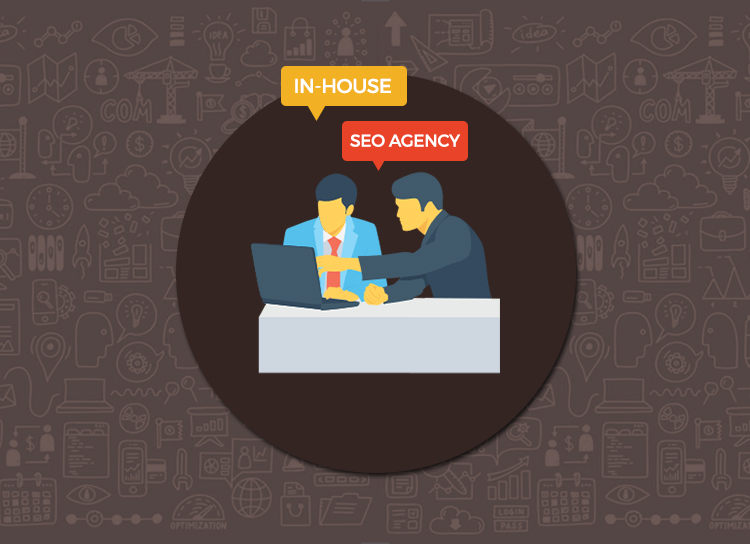As is the case with most things in life, there are only two ways to go about Search Engine Optimization (SEO). Do it yourself or get someone else to do it for you. Many people would quickly choose the first option. After all “When you want it done right, you’ve got to do it yourself” is a very popular concept and correct in most cases.
But what if you don’t know anything about what needs to be done? What if you don’t have the time or resources for it either? The situation calls for practical hands-on expertise—and when it comes to SEO, it means either create your own team or hire an SEO agency.
Using common sense, factual data and industry trends, this blog post will breakdown how outsourcing still is the undisputed king of this seemingly never-ending battle with in-house teams.
1. Going In-House Is Expensive
Building an in-house SEO team entails hefty short-term and long-term expenses.
According to GlassDoor, the national average salary per year ranges between $36,000 and $88,000. That’s more than $5000 spent on one full-time employee per month, and this is just one part of the overall expense.
In addition to their salary, you need to allocate a budget to office space, computers and associated overheads that you would for an in-house team. Once those expenses are take care of, you’ve got benefits and health insurance. Also, your Human Resources team will be responsible for processing payroll and calculating taxes for the new team members.
Add all expenses—you know that’s a completely outrageous figure, right?In short, an in-house team can be quite heavy on your organization’s pockets. If you are running a small-scale business, with limited funding, then you need a better alternative.
Outsourcing SEO as in working with an SEO Agency means that you’ve only got to deal with one person, not the whole team. Third-party SEO teams typically assign one account manager to each client, who tackles the ins and outs of writers, link builders and designers. All you’ve got to do is let them know what services you need, and settle on a deadline. No personality issues, no extra management, and best of all, no additional costs.
Just sit back and watch the SEO magic happen. Working with an SEO Agency entails an easy monthly retainer setup, and all you’re tasked with is to provide review and feedback.
2. You’re Not Sure What or Who the Team Should Consist Of
SEO—it’s all about using the right set of keywords in the content, right?
Wrong. Many in-house marketers have yet to be aware of the nuances of search engine marketing. Keyword research and analysis is only the beginning; effective search marketing strategies involve high-quality content writing and link building—two of the most significant factors for ranking for Google algorithms.
Imagine getting all of this done in-house. How many writers, link builders, designers and developers will you need? On what basis do you interview them: skills, experience, dedication, competence? Conducting Search Engine Optimization in-house can become very challenging, especially if you are aiming for page-one ranking.
An SEO agency is focused specifically on search marketing, which means they have a team of seasoned experts. We’re talking professionals at every stage of SEO, the salesperson who contacts you on the first meeting and explains the SEO process, to the analytical expert who will study the changes in lead generation and conversion.
They know how to delegate work— assigning your content to experts who specialize in your industry and wrapping it well before the deadline is a breeze for them.
It’s like having access to the best talent across each essential facet of the SEO process within the right time and budget.
3. Outsourcing SEO through an Agency is Much Easier than making a team from scratch
Starting out on in-house SEO team?You’re testing waters. Checking to see which techniques work, and which don’t. Between learning and deploying these methods, the in-house team’s work terms become tricky to handle. Plus, you are responsible for each and every decision.
You’ve got a contract with your team—who may or may not perform well, you’re seeing every expense through and you’re starting out from SEO square one. Outsourcing the task may be the smarter choice.
Conventionally, SEO agencies have no contracts; you renew your SEO services package on a monthly basis. All costs are determined up-front, which means you can let go of the stress of unexpected or hidden fees.
Additionally, you can gain access to a number of online marketing services when working with an SEO agency.You can lean on your SEO agency for other marketing needs—that is, if they provide a full set of online marketing services. These include SEO-based content development, website design and development, pay-per-click (PPC) advertising, reputation management, and so on.
4. You’ll Spend More Time Setting up the Team than on SEO for Your Website
According to Google,30% of mobile searches, which are increasingly becoming more popular than desktop searches, are related to a specific location. Research shows that 72% of people who conduct a local search end up visiting a store within a five-mile radius.
The message behind these facts is that every day wasted is a day your target audience is not doing business with you and competitors are getting the edge.And when setting up an in-house SEO team, you waste a considerable amount of time, most which involves training and rectifying content errors.
On the other hand, a third-party SEO team is prepped and ready to go. Within a matter of minutes, you can set up a new client account, receive your content in a couple of weeks, and rank better within a month.
It’s that simple and efficient.
It’s Just Not Worth It
50% of modern search queries consist or 4 or more words. Voice-search is becoming increasingly popular, which means these queries often contain “natural speak”. Marketers today are also considering SEO as one of their top priorities, with 82% reporting rising effectiveness of SEO strategies.
In short, competition is increasing, even amongst businesses in niche business sectors. As your competitors become better at SEO with each passing day, you’ve got no time and money to waste. If you want to achieve your SEO goals as soon as possible, the SEO agency approach is your way to go.
If you go for a full-service SEO agency such as SearchBerg, then you can cut the time associated with other online marketing services. Full-service companies often do multiple tasks simultaneously.
In one month, you will receive trendy keywords, have your website updated, post new blog content and remain active on social media platforms.
You can start off with just SEO, and expand your services package as your business takes off and grows.
Then there is a matter of B2C vs.B2B Search Engine Optimization. Most in-house marketers specialize in B2C SEO. Your B2B SEO strategy requires ultra-precise industry-specific keywords. According to Demand Gen Report’s 2017 survey of content preferences, B2B customers prefer prescriptive style of content. When you are looking to build relationship with professional, not pitch a new product to customers, the tone matters. Expert SEO teams consist of both B2C and B2B SEO experts.
If you want to ensure that your SEO investment is worth it, outsource it. The world of online marketing tactics in only set to become more competitive with time. Why not let the pros do what they do best, and give your business the best shot at great search engine rankings?
Do It Right, Hire An Expert SEO Agency
Search Engine Optimization is complex science. Google changes its search engine algorithms over 500 times every year, with new iterations introduced every few months. Marketers—especially those working in a small-scale business—need professional help to keep up with current and future evolutions of SEO.
An expert SEO agency will not only save precious time, but also keep you informed on any changes in the digital marketing landscape. If they offer other services, you can scale as you please and opt for marketing tactics that further support SEO.
You don’t have to have an over-the-top budget either; unlike many traditional marketing methods, search marketing is by far one of the most cost-efficient. So what are you waiting for? Contact an SEO Agency today!



 Localizing Content
Localizing Content

